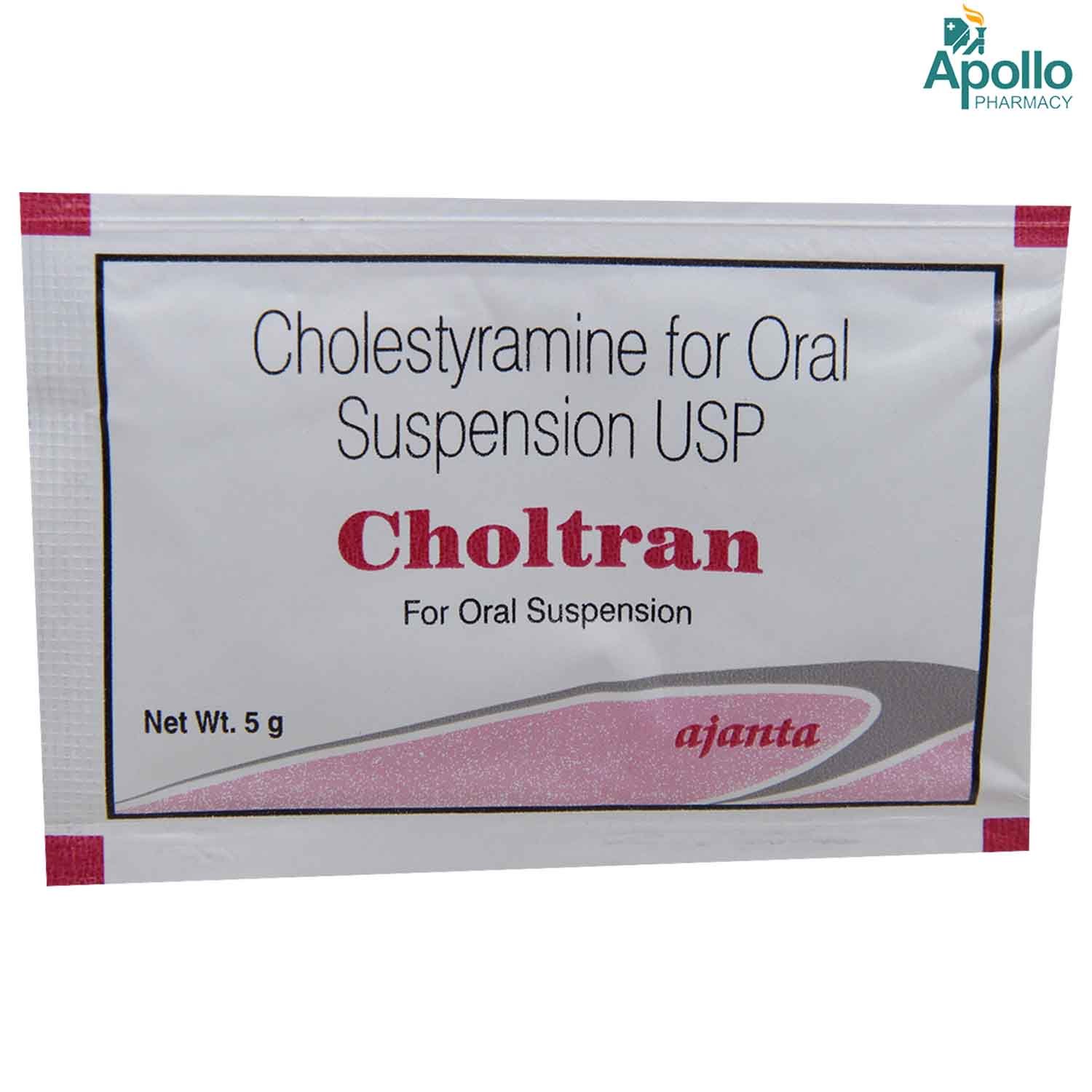Cholestyramine
About Cholestyramine
Cholestyramine belongs to the class of cholesterol-lowering medicines called bile acid-binding resins primarily used to lower bad cholesterol levels, thereby reducing the risk of heart attack and stroke in future. Cholestyramine also treats itching caused by a blockage in the gallbladder's bile ducts. High cholesterol, known as hyperlipidaemia or dyslipidemia, occurs when there is an excess of the unhealthy balance of cholesterol in the blood. When the cholesterol level is high in the blood, your arteries get narrowed and clogged, contributing to heart diseases like stroke and heart attack.
Cholestyramine contains Cholestyramine that works by binding to bile acids which aid fat digestion in the intestine and prevent its reabsorption into the bloodstream, thereby excreting it via faeces. This, in turn, triggers the liver to produce more bile acids from the blood's cholesterol and decreases bad cholesterol (LDL) levels in the blood. Thus, Cholestyramine reduces the risk of stroke or heart attack by reducing the brain's excess cholesterol deposition and the heart's major blood vessels.
Take Cholestyramine as instructed by your doctor. Some people may experience constipation, nausea, vomiting, diarrhoea, stomach pain or flatulence (gas). Most of these side effects of Cholestyramine do not require medical attention and gradually resolve over time. However, if the side effects persist, please consult your doctor.
If you are allergic to Cholestyramine or any other medicines, please tell your doctor. Before taking Cholestyramine, please consult a doctor if you are pregnant or breastfeeding. Cholestyramine is not recommended for children below 6 years of age, as the safety and effectiveness were not established. Avoid taking Cholestyramine if you have gallstones or blockage in the stomach or intestines. You are recommended to take other medicines 1 hour before or 4-6 hours after taking Cholestyramine as taking at the same time may reduce the effectiveness of other medicines.
Uses of Cholestyramine
Medicinal Benefits
Cholestyramine contains Cholestyramine that binds to bile acids (help in the digestion of fats consumed in the diet) in the intestine and removes them from the body. This makes the liver to produce more bile acids from the cholesterol in the blood and decreases cholesterol levels. Also, Cholestyramine reduces the risk of stroke or heart attack by reducing the excess cholesterol deposition in the major blood vessels of brain and heart.
Directions for Use
Storage
Side Effects of Cholestyramine
- Constipation
- Nausea
- Vomiting
- Diarrhoea
- Stomach pain
- Flatulence (gas)
Drug Warnings
If you are allergic to Cholestyramine or any other medicines, please tell your doctor. Before taking Cholestyramine, please consult a doctor if you are pregnant or breastfeeding. Cholestyramine is not recommended for children below 6 years of age, as the safety and effectiveness were not established. Maintain a low-fat diet along with Cholestyramine for effective results. Avoid taking Cholestyramine if you have gall stones or blockage in the stomach or intestines. If you have diabetes, thyroid disorder, kidney, liver or heart problems, inform your doctor before taking Cholestyramine. You are recommended to take other medicines 1 hour before or 4 to 6 hours after taking Cholestyramine as taking at the same time may reduce the effectiveness of other medicines. Drink plenty of water while taking Cholestyramine to prevent constipation as one of the side effect of Cholestyramine in some cases.
Drug Interactions
Drug-Drug Interaction: Cholestyramine may interact with a painkiller (aspirin), antithyroid drug (levothyroxine), pain reliever, and fever reducer (acetaminophen,) and vitamin (cholecalciferol).
Drug-Food Interaction: Inform your doctor if you are taking any multivitamins, dietary supplements, or OTC medicines.
Drug-Disease Interaction: If you have gallstones, blockage in the stomach or intestines, diabetes, thyroid disorder, kidney, liver, or heart problems, inform your doctor before taking Cholestyramine.
Drug-Drug Interactions Checker List:
Safety Advice

Alcohol
cautionInteraction of Cholestyramine with alcohol is unknown. Please consult a doctor before consuming alcohol while using Cholestyramine.

Pregnancy
cautionCholestyramine is a category C pregnancy drug and is given to pregnant women only if the doctor thinks benefits outweigh risks. However, please consult a doctor if you are pregnant.

Breast Feeding
cautionIt is unknown whether Cholestyramine is excreted in human milk. Therefore, please consult a doctor if you are breastfeeding. Cholestyramine is given to breastfeeding mothers only if the doctor thinks benefits are greater than risks.

Driving
not applicableCholestyramine usually does not affect your ability to drive or operate machinery.

Liver
cautionTake Cholestyramine with caution, especially if you have a history of Liver diseases/conditions. The dose may be adjusted by your doctor as required.

Kidney
cautionTake Cholestyramine with caution, especially if you have a history of Kidney diseases/conditions. The dose may be adjusted by your doctor as required.

Children
cautionCholestyramine is not recommended for children below 6 years of age. However, Cholestyramine should be used with caution in children above 6 years if recommended by a doctor.
Habit Forming
Diet & Lifestyle Advise
- Maintain a low-fat diet. Limit your intake of dairy products made with whole milk and red meat. Prefer skim milk and fat-free or low-fat dairy products.
- Eat a healthy diet that includes fruits, vegetables, fish, poultry, whole grains, nuts and cut down beverages, processed and sugary foods.
- Do regular exercise such as swimming, cycling, walking or dancing and focus on losing weight as obesity also raises bad cholesterol and lowers good cholesterol.
- Avoid smoking and alcohol consumption.
Special Advise
Regular blood tests are recommended while taking Cholestyramine to monitor cholesterol levels in the blood and kidney functioning.
Patients Concern
Disease/Condition Glossary
High cholesterol: Also known as hyperlipidemia or dyslipidemia occurs when there is an excess of the unhealthy balance of cholesterol in the blood. When there is a high cholesterol level in the blood, your arteries get narrowed and clogged that finally contributing to heart diseases, like stroke and heart attack. Eating high-fat or high-cholesterol-containing food/drinks and genetic factors are the primary causes of high cholesterol. There are two types of cholesterol found in our body: good cholesterol (high-density lipoprotein) and bad cholesterol (low-density lipoprotein). Good cholesterol is good for our heart and helps in reducing the bad cholesterol in our body. On the other hand, excess bad cholesterol (LDL) leads to the risk of heart diseases like heart attack and stroke.
FAQs
Cholestyramine contains Cholestyramine that binds to bile acids (help in the digestion of fats consumed in the diet) in the intestine and removes them from the body. This makes the liver to produce more bile acids from the cholesterol in the blood and decreases cholesterol levels. Also, Cholestyramine reduces the risk of stroke or heart attack by reducing the excess cholesterol deposition in the major blood vessels of brain and heart.
You are not recommended to take Cholestyramine with levothyroxine at the same time as it may reduce the absorption of levothyroxine and decrease its effectiveness. Therefore, you are recommended to take levothyroxine after 4 hours of taking Cholestyramine. However, please consult a doctor before taking Cholestyramine with any other medicines.
Cholestyramine may be used to treat certain types of diarrhoea such as bile acid diarrhoea in which excess bile acids spill into the large intestine and trigger watery and loose stools. However, please consult a doctor before taking Cholestyramine.
Cholestyramine decreases the absorption of certain vitamins such as fat-soluble vitamins (A, D and K) by the body especially when taken in high doses or for long period. Therefore, your doctor may recommend you to take vitamin supplements with Cholestyramine.
You are not recommended to stop taking Cholestyramine without consulting your doctor as it may worsen the condition and increase the risk of heart attack and stroke. Therefore, take Cholestyramine for as long as your doctor has recommended it, and if you experience any difficulty while taking Cholestyramine, please consult your doctor so that the dose may be gradually reduced.
Cholestyramine may cause constipation as a common adverse effect. You are advised to drink plenty of fluids while taking Cholestyramine to prevent constipation. However, if the condition persists or worsens, please consult a doctor.




